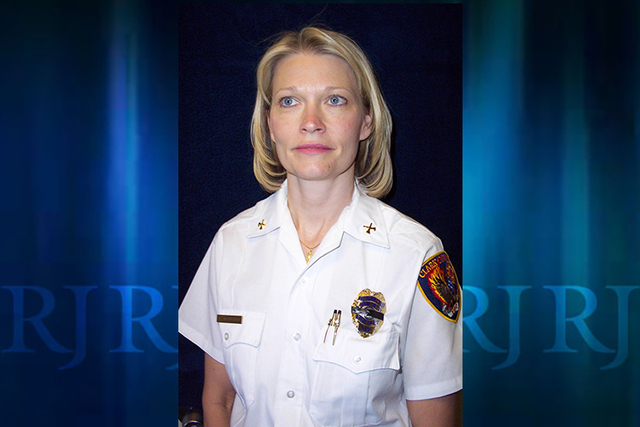Firefighter fired, rehired in Clark County sick leave probe fights for disability pay
Clark County firefighter Donald Munn’s 20-year firefighting career didn’t end with a plaque and public words of praise from his county bosses.
His career was winding down by the end of 2013 after a tumultuous three years.
He had been fired in 2011 as part of the county’s sick leave abuse probe, and reinstated to the Fire Department in 2012 after an arbitrator cleared him of wrongdoing. He also had sued the county over his firing. In December 2013, both sides were finalizing a settlement of $50,000 that also would require Munn to retire.
The sick leave scandal had generated headlines and ignited public anger toward firefighters throughout the valley, putting the county Fire Department under intense scrutiny. It sparked an internal county probe that uncovered email records raising questions about sick days being routinely scheduled in advance, with the shifts covered by firefighters working overtime.
The benefit was intended to award sick leave when employees or their families were really sick.
Additional email records recently obtained by the Review-Journal show what transpired behind the scenes in December 2013.
They showed that as top managers were drafting a public statement about the settlement, a senior county attorney, Chief Deputy District Attorney Stephanie Barker, wrote that she wished the agency could publicly say Munn is a liability to taxpayers and “accident prone.”
At that point, Munn was on light duty working as an administrative firefighter, and did tasks such as delivering equipment and doing errands like transporting vehicles not on emergency calls. He suffered a back injury in 2010 while on the job and was diagnosed with a heart condition in 2012.
Munn had sued the county in federal court in 2012, alleging defamation, negligence, invasion of privacy and a violation of his due process rights. He had contended he followed all the rules and was unfairly tarnished in the county’s probe of the Fire Department’s use of sick leave. Munn’s sick leave use included time for a kidney problem and to help his wife care for an adopted son, who has developmental issues from fetal alcohol syndrome.
Although the federal lawsuit was settled more than a year later, remnants of the dispute are lingering.
DISABILITY CASE LINGERS
At the center of the latest dispute involving Munn is his push to get a permanent disability benefit that is given under state law to firefighters who have a heart condition.
In February of this year, Munn filed a complaint with the Nevada attorney general’s office about Barker, alleging she fraudulently presented an offer for a total permanent disability to get a settlement in his federal lawsuit. The attorney general’s office declined comment on the complaint.
Munn’s complaint also alleges that a county workers’ compensation staffer advised him not to tell his heart doctor that he was working light duty as an administrative firefighter. Munn, however, said he truthfully disclosed to medical staff he was working light duty.
In an email statement Friday, Barker said she was unaware of the complaint and called its allegations “patently false.”
After Munn left the county in December 2013, his total permanent disability benefit was denied on grounds he could work as an administrative firefighter. Munn filed a lawsuit against Clark County Risk Management and the state Department of Administration appealing that outcome. That case is pending in Clark County District Court.
Barker also stressed that Munn’s settlement agreement didn’t make any promises about what position the county would take in regard to a claim.
“No promises were made by me to Mr. Munn in that regard,” Barker said, adding that the county met the terms of the settlement.
The total permanent disability benefit is separate from the state pension that Munn qualified for as a firefighter.
For his part, Munn said he loved the job and helping people on calls throughout his career.
“It was either termination and take what they offer me, or spend another year or so in federal court,” Munn said of the settlement.
County officials declined to comment on the outcome of the lawsuit — the $50,000 settlement.
“We have no comment,” spokesman Erik Pappa said Thursday in an email.
But county officials had planned to say more publicly about it back in December 2013, when lawyers were finalizing Munn’s settlement agreement, correspondence shows.
PR PLANNING
On Dec. 12, 2013, County Manager Don Burnette and Barker had an email exchange about a planned press release on the settlement for Munn’s case. Barker, who had represented the county in the case, told Burnette they couldn’t disclose the full picture of the settlement.
“The problem is that we’ve agreed to pay him to leave because he’s an ongoing liability — in large part because he’s had four work comp claims in the last year (in an administrative firefighter position),” Barker wrote. “He’s costing us money. But we can’t tell the public about the work comp claims.”
The Review-Journal obtained the exchange through a public records request for emails exchanged between Pappa and Burnette during a one-year period. Barker’s note to Burnette was forwarded on to Pappa, though officials never issued a press release about the settlement.
Barker’s suggestion was to focus on cutting the costs of litigation and allowing the department to move on beyond the sick leave abuse issues.
Barker didn’t detail the nature of Munn’s workers’ compensation claims in her email.
Court records show that Munn had filed a workers’ comp claim due to a heart condition, which required a trip to the emergency room at University Medical Center in 2012 after he started his shift. Barker’s correspondence with Munn’s attorney about settlement discussions in October 2013 shows she was aware of his heart condition.
In her December 2013 email to Burnette, Barker appeared wistful that the county couldn’t say more.
“If you think I’m headed in the wrong direction, let me know. But we can’t say: ‘He’s an ongoing liability to the taxpayer because he’s accident prone, and we could fill his position with someone much more productive,” Barker wrote, adding “which is what we’d like to say.”
Burnette told Barker he’s fine with not talking about Munn’s claims or health issues.
“I’m more interested in saying by settling the litigation now we will avoid future costs associated with defending our position in litigation, and we will also reduce our OT expenses in suppression,” Burnette emailed. “Translation: if I can fill the position with someone who actually works shifts as a firefighter, there will be fewer OT shifts and costs in the process.”
Administrative firefighter positions such as Munn’s are required under the firefighters’ union contract. When firefighters can’t medically work their regular jobs, they’re allowed to work in an administrative position.
Munn’s attorney, Andrew Rempfer, said Barker’s email shows what he and his client have alleged — that the county discriminates against those who are hurt, injured or have medical issues.
ANOTHER SETTLEMENT
The other firefighter who was fired in the overtime probe, Renee Dillingham, was the county’s first female battalion chief. An arbitrator in 2012 ruled that she should be reinstated with full pay. The county settled for $15,000 after she filed a federal lawsuit in 2013 alleging she was fired because of her gender, records show.
That case turned up email records in which Dillingham appeared to be helping another battalion chief arrange sick leave months in advance. The arbitrator found Dillingham didn’t have any special duty to police the sick leave of other battalion chiefs after Dillingham argued other supervisors signed off on the sick leave.
Dillingham’s lawsuit had alleged her male counterparts who were battalion chiefs weren’t fired and received lesser forms of discipline such as reprimands and coaching for comparable actions.
Her attorney couldn’t be reached for comment.
She retired in May 2014 after her case was settled.
County officials declined to comment on the outcome of her case, too.
Contact Ben Botkin at bbotkin@reviewjournal.com or 702-405-9781. Find him on Twitter: @BenBotkin1.



















